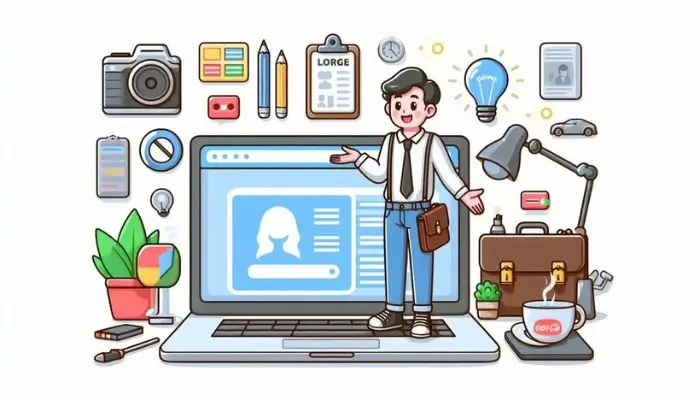Why website is necessary for a business growth?
Having a website is really important for any business these days. Think about it like this: if you have a physical store, it helps people find you when they’re walking around the neighborhood. Your store’s location and sign make it easier for people to discover you. In the same way, a website acts as your digital storefront. When people search online for products or services you offer, your website helps them find you. It’s like having an online shop where people can learn all about what you offer, view your products or services, and find out how to contact you. Plus, having a website means you’ll show up in search engines like Google, Bing, and Yahoo, which helps even more people find your business easily.
A website also makes it much simpler for potential customers to learn about your business. They can see what you offer, understand your brand, and get in touch with you whenever they want. If you want your business to be successful today, having a strong online presence is essential. This means having a website that makes it easy for people to discover and connect with you. It helps you reach a larger audience and keeps your business in the spotlight, making sure that people can find and learn about you effortlessly.
Here are a few more reasons why having a website is important for your business:
1. Your Online Presence: The New Business Card
Think about a person you meet at an event. What do you do… a business card exchange or something? Similarly, your website is a digital business card. That is, where people go to find out what you have done in the past or are currently doing… and how they may contact you. Without a website, potential customers might not know you exist. Example: Suppose you run a bakery. If someone searches online for “best cakes near me” and you don’t have a website, they’ll probably end up finding your competitors who do. A website lets you showcase your delicious cakes, provide your location, and even share customer reviews—all of which can attract new customers.
2. Building Credibility: Establishing Trust
A well-designed website helps build trust with people who might want to do business with you. It shows that your business is real and professional. Just like you might judge a book by its cover, people judge businesses by their websites. A clean, easy-to-use website makes you look more trustworthy.
For example, if someone needs a local plumber, they will probably search online. If your plumbing business has a professional website with good reviews, people are more likely to trust you. But if your site is missing or looks bad, they might not take you seriously. A good website helps prove that your business is real and reliable.
3. Always Available: Open 24/7
Your website is open 24 hours, unlike a brick-and-mortar location This will ensure that your business gets exposure 24/7 no matter the time of day and potential buyers can check on what you have to offer or even make a purchase from wherever at any given moment.
For example, consider you are running an online boutique. For instance, a customer might still get her perfect dress at midnight browsing your site and placing an order. You would lose that???? sale because your shop is only open when the sun is up!
4. Marketing Hub: Central to Your Strategy
Your website is very important for your online marketing. It’s where all your social media posts, email newsletters, and online ads should lead people. A good website helps turn all the interest you get from these efforts into real customers.
For example, let’s say you have a yoga studio. You might post yoga tips and class schedules on Instagram. When people click the link in your bio, they should be taken to your website where they can sign up for classes, learn about your instructors, and book their spot. If you don’t have a website, you could lose out on turning that interest into actual sign-ups.
5. Showcasing Products and Services: Your Digital Showroom
A website allows you to display your products or services in detail. It’s like having a showroom where customers can see what you offer, read descriptions, and get a sense of what’s available.
For example: if you own a landscaping business. You can post before and after pictures of past jobs, list your rates for services, or more. This helps potential clients know what to expect and makes it easier for them to feel comfortable in choosing you.
6. Staying Competitive: Keeping Up with the Joneses
Cash flow is key for business, and having a website is becoming more important. Without one, your competitors with websites might get ahead. It used to be okay to run a business without a website, but now it’s essential to stay competitive.
Example: Think about a local gym. If all the other gyms in town have websites with class schedules, trainer profiles, and membership options, but you don’t, people might think your gym isn’t up-to-date or doesn’t offer the same level of service.
7. Understanding Your Audience: Insights and Analytics
A website also gives me data about what people do on your site. Google Analytics will tell you what people like, how they got to your site, and where they went on it. This information is like gold, it helps you to continue your business strategies
For example, if you run a coffee shop it is possible to discover the majority of visitors on your website are focused on seasonal drinks. With this data, you can put those drinks on blast, or expand your seasonal offerings based on what the people want.
8. Selling Online: Expanding Your Reach
If you are selling physical products using your business, then through a website with e-commerce functionality this will allow you to get in front of local people outside the area where they live. You can distribute the products to anyone in your country even worldwide.
For instance, if you create jewelry items in the online store and someone from another city or country sees your stuff, they can order it themselves. It greatly expands your potential market beyond what you can reach with a physical store.
9. Customer Service: Easy Access to Information
Customer service resource center You can also include FAQs, contact forms, live chat options customer support resources that make it easy for the customers to seek help or find out information at any time.
Example: Imagine you operate a software company. Your website can include a detailed FAQ section, user guides, and a support ticket system. This makes it easier for customers to troubleshoot issues themselves or contact support when needed.
10. Branding: Telling Your Story
Your website is a platform to tell your brand’s story and communicate your values. It helps create a cohesive brand image through design, content, and user experience.
Example: Suppose you run a nonprofit organization focused on environmental conservation. Your website can share stories about your projects, showcase the impact of donations, and provide ways for people to get involved. This helps build a strong, emotional connection with your audience.
11. Easy Updates: Keeping Information Current
This we one can find in A Website is Easier to Update. You can make updates to let your audience know about new products, changing business hours, or upcoming events.
For example, let’s say you own a restaurant — quickly update your menu online the moment any new dishes are added, or price adjustments are made. So that your customers have the most up-to-date information before they arrive.
12. Collecting Leads: Building Your Customer List
A website can help you collect leads and build a list of potential customers. You can use forms to capture email addresses and other contact information, which you can then use for future marketing campaigns.
Example: if you are a real estate agent you could give away something like free home-buying guide in exchange for their contact information. And with that delivered lead you build a list of potential buyers to follow up on using email marketing.
13. Showcasing Customer Reviews: Building Trust
By showing reviews and testimonials of customers on your website, you can win the trust of future clients. Testimonials from happy clients can also help to persuade new visitors in picking your business.
For example, if your business is a cleaning service, testimonials from some of the clients who are satisfied with your work on your website can convince people to use could create trust in how will do it for these possible customers.
14. Cost-Effective Advertising: Cheap Marketing
There is no other better way to advertise your business at a lower cost than the traditional methods. You can tap into a wide audience without spending the high price tags of print or TV advertising.
Example: If you’re a freelance graphic designer, instead of spending money on expensive print ads, you can invest in a well-designed website. Your site can showcase your portfolio, list your services, and attract clients from all over the world.
15. Flexibility and Control: Customizing Your Online Presence
A website is a tool that allows you to tell your own story online. You use social media to design it with your brand personality and as you change the focus of the business.
If you have a pet grooming business, for example, your website is going to look like this with nice, cute pets photography and friendly design plus easy navigation. You can update it as your business expands to add extra features or sections for the advantage of those you serve.
Conclusion: Essential for Today’s Business Landscape
In your digital era now, without a website as part of the overall business strategy, you are lost. It increases your credibility, but it is not a benefit. From a small mom-and-pop shop to an enterprise corporation — each needs (yes NEEDS) at minimum their website to reach outside of traditional means.
Having a website is like having an old shop with no signs on it (Jewett, P., 2014) Defined space Ghost pack This is your opportunity to make a lasting first impression and continue staying in contact with the people who bring revenue into your business.
In a world where almost everything happens online, not having a website is like having a store with no sign out front. It’s your chance to make a great first impression, stay engaged with your customers, and keep your business thriving.






